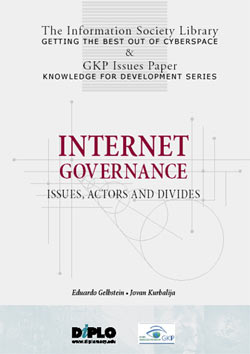
Robert Guerra kindly handed me three books back when we met in Sevilla. One of them was Internet Governance. Issues, Actors and Divides, by Jovan Kurbalija and Eduardo Gelbstein. As the authors themselves state, there are at least five dimensions to Internet issues: Infrastructure, Legal, Economic, Development, and Socio-cultural. Each one is discussed in the chapters that follow
.
Personally, I find the book really interesting and, honestly, much broader in scope and depth than an initial understanding of governance might bring to one’s mind. Actually, I’d compare it to Chris Nicol’s ICT Policy: A Beginner ’s Handbook as they share most of the aim, being Internet Governance. Issues, Actors and Divides more recent, and, indeed, going some steps further than Nicol’s. Both books make, in my opinion, a perfect pair to have a good overview — and something — on what is the Internet and how it does affect me. In other words: they both represent perfect e-awareness raisers.
Taking the book as a toolkit, and quoting again:
The main purpose of such an Internet Governance Toolkit would be to:
• organise the tools currently used in the Internet Governance debate;
• create additional cognitive tools;
• facilitate the inclusive nature of the Internet Governance process by providing interested parties with the tools to understand the issues, positions, and developments.The Internet Governance Toolkit consists of:
• patterns and approaches;
• guiding principles;
• analogies.

Perspectives associated with Internet Governance
[image taken from the book]
Concerning the part of development and the digital divide, this table is of special interest to me:
ICT does NOT facilitate development:
• The “network externalities” help firstcomers establish a dominant position. This favours American giants so that local firms in emerging economies would be effectively frozen out of ecommerce.
• The shift in power from seller to buyer (the Internet inevitably gives rise to “an alternative supplier is never more than a mouse-click away” scenario) will harm poorer countries. It will harm commodity producers mainly from developing countries.
• Higher interest in high-tech shares in rich economies will reduce investor interest in developing countries.ICT facilitates development:
• ICT lowers labour costs; it is cheaper to invest in developing countries.
• Very fast diffusion of ICT across borders occurs, compared to earlier technologies. Previous technologies (railways and electricity) took decades to spread to developing countries, but
ICT is advancing in leaps and bounds.
• The opportunity to leapfrog old technologies by skipping intermediate stages such as copper wires and analogue telephones encourages development.
• ICT’s propensity to reduce the optimal size of a firm in most industries is much closer to the needs of developing countries.
While the list is not complete, it does give some good hints on what is happening on the developing countries arena.
More info
- Book page
- Downloadable version
 (2.22 Mb)
(2.22 Mb)
If you need to cite this article in a formal way (i.e. for bibliographical purposes) I dare suggest:
Peña-López, I. (2007) “Book: Internet Governance. Issues, Actors and Divides” In ICTlogy,
#44, May 2007. Barcelona: ICTlogy.
Retrieved month dd, yyyy from
https://ictlogy.net/review/?p=549
Previous post: Trip to the Berkman Center and Yale Law School
Next post: World Information Society Report 2007 and Digital Opportunity Index 2007
4 Comments to “Book: Internet Governance. Issues, Actors and Divides” »
 RSS feed for comments on this post.
TrackBack URI
RSS feed for comments on this post.
TrackBack URI


You created a very interesting name to your blog :-)
The book about governance, written by Kurbalija and Gelbstein, is an important contribution, specially now that the IGF will be in Brasil, next november. My pos-doc is about Internet Governance, so questions concerning free expression, potenciality of access, digital divide interest me. About your inicial discussion, it seems to me that ICT facilitates development,because of the possibility of collective construction, although many countries are far away from this.
At last someone who understood what ICTlogy’s name stands for! ;)))
And here I was thinking I was the only one who enjoyed this kind of book hehe. Glad to know i’m not alone in this world.
I think of ICT as a very powerful tool, that without uses is neutral, can help or can block development. The problem is almost always the same, the people who use IT, and how they use them. Of course a big company has some advantages (lots of money, engineers, and a solid structure), but you have quite a nice dissertation here between how it helps and how it doesn’t help. Thanks for the download ;)
Pingback: The core Internet institutions abandon the US Government | Privately Investigating